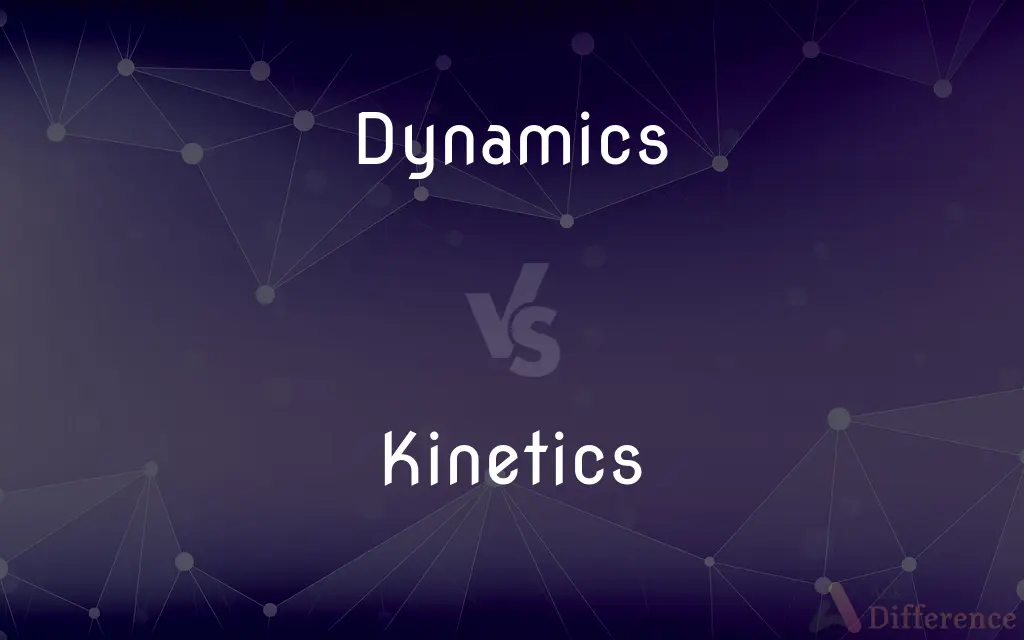Dynamics vs. Kinetics — What's the Difference?
By Tayyaba Rehman & Fiza Rafique — Updated on March 19, 2024
Dynamics is the study of forces and their effects on motion, whereas kinetics focuses on the rates of processes.

Difference Between Dynamics and Kinetics
Table of Contents
ADVERTISEMENT
Key Differences
Dynamics involves the analysis of forces and their impact on an object's motion, considering aspects like velocity and acceleration. Kinetics, on the other hand, primarily deals with the rate at which chemical reactions occur and the factors that influence these rates, such as temperature, concentration, and the presence of catalysts.
Dynamic is a branch of physics that seeks to describe the relationship between motion and the forces affecting it, often using Newton's laws of motion as a foundation. Kinetic is a crucial part of physical chemistry and biochemistry, providing insight into reaction mechanisms and the energy changes that accompany chemical reactions.
Dynamics can be divided into two main categories: linear dynamics, which deals with objects moving in a straight line, and rotational dynamics, which focuses on objects that are spinning or rotating. Kinetics explores how and why chemical reactions proceed at specific rates.
Comparison Chart
Main Focus
Forces and their effects on motion
Rates of chemical reactions and factors influencing them
Branch of
Physics
Chemistry
ADVERTISEMENT
Key Principles
Newton's laws of motion
Reaction rate laws
Applications
Mechanical engineering, robotics, astrophysics
Chemical engineering, biochemistry, pharmacology
Types
Linear dynamics (straight line motion), rotational dynamics (spinning or rotating objects)
Chemical kinetics (reaction rates), enzyme kinetics (biochemical reactions)
Compare with Definitions
Dynamics
The investigation of physical forces and their effects on moving objects.
Studying the dynamics of a roller coaster ensures riders' safety.
Kinetics
Analysis of how different conditions influence the pace of chemical changes.
Investigating the kinetics of an enzyme-catalyzed reaction reveals optimal conditions for activity.
Dynamics
The study of the relationship between motion and the forces affecting it.
Analyzing a swinging pendulum involves dynamics to understand its motion.
Kinetics
The study of the rate at which chemical reactions occur.
Kinetics can determine how fast a medication will react in the body.
Dynamics
Analysis focusing on the cause of motion.
Dynamics can explain why a ball rolls down a slope.
Kinetics
The measurement and modeling of reaction rates.
Kinetics is used to predict how long a chemical storage material can remain stable.
Dynamics
The examination of how objects move and the forces that cause such movements.
The dynamics of planetary orbits helps predict their future positions.
Kinetics
The exploration of reaction mechanisms and energy changes.
Kinetics provides insights into the steps involved in a chemical reaction.
Dynamics
A branch of mechanics that deals with forces and their impact on motion.
Dynamics is crucial in designing safe and efficient vehicles.
Kinetics
A branch of chemistry that examines the factors affecting the speed of reactions.
Kinetics helps in optimizing industrial chemical processes.
Dynamics
(used with a sing. verb) The branch of mechanics that is concerned with the effects of forces on the motion of a body or system of bodies, especially of forces that do not originate within the system itself. Also called kinetics.
Kinetics
See dynamics.
Dynamics
(used with a pl. verb) The forces and motions that characterize a system
The dynamics of ocean waves are complex.
Kinetics
The branch of chemistry that is concerned with the rates of change in the concentration of reactants in a chemical reaction.
Dynamics
(used with a pl. verb) The social, intellectual, or moral forces that produce activity and change in a given sphere
The dynamics of international trade have influenced our business decisions on this matter.
Kinetics
(mechanics) The branch of mechanics concerned with motion of objects, as well as the reason i.e. the forces acting on such bodies. This, along with kinematics constitute dynamics, which is concerned purely with the effects of forces on moving bodies.
Dynamics
(used with a pl. verb) Variation in force or intensity, especially in musical sound.
Kinetics
(chemistry) The branch of chemistry that is concerned with the rates of chemical reactions.
Dynamics
(used with a sing. verb) Psychodynamics.
Kinetics
See Dynamics.
Dynamics
(mechanics) The branch of mechanics that is concerned with the effects of forces on the motion of objects.
Kinetics
The branch of mechanics concerned with the forces that cause motions of bodies
Dynamics
(music) The volume of the sound, such as piano, mezzo piano, mezzo forte, and forte.
Dynamics
Forces that stimulate growth, change, or development.
The changing dynamics in international politics led to such an outcome.
Dynamics
That branch of mechanics which treats of the motion of bodies (Kinematics) and the action of forces in producing or changing their motion (kinetics). Dynamics is held by some recent writers to include statics and not kinematics.
Dynamics
The moving moral, as well as physical, forces of any kind, or the laws which relate to them.
Dynamics
That department of musical science which relates to, or treats of, the power of tones.
Dynamics
The branch of mechanics concerned with the forces that cause motions of bodies
Common Curiosities
How do dynamics and kinetics differ in focus?
Dynamics focuses on physical forces and motion, whereas kinetics deals with the rates of chemical reactions.
What is dynamics?
Dynamics is the branch of physics that studies the forces and their effects on motion.
What role does temperature play in kinetics?
Temperature can significantly affect the rate of chemical reactions, often accelerating them as it increases.
Can dynamics apply to fields outside of physics?
While primarily a physics term, dynamics principles are applied in engineering, robotics, and even economics to describe systemic changes.
Is kinetics limited to chemistry?
Though predominantly a chemistry term, kinetics also has applications in biology, pharmacology, and environmental science.
What are reaction rate laws in kinetics?
Reaction rate laws describe the relationship between the rate of a reaction and the concentration of its reactants.
What is rotational dynamics?
Rotational dynamics deals with the motion of objects that are spinning or rotating.
What is kinetics?
Kinetics is the study of the rates of chemical reactions and the factors that influence these rates.
Are dynamics and kinetics relevant to everyday life?
Yes, dynamics can explain phenomena like car crashes and sports mechanics, while kinetics is crucial in understanding cooking, medication efficacy, and more.
What is linear dynamics?
Linear dynamics refers to the study of objects moving in a straight line under the influence of forces.
How do Newton's laws relate to dynamics?
Newton's laws of motion are foundational principles in dynamics, describing the relationship between forces and motion.
How does concentration affect reaction rates in kinetics?
Generally, increasing the concentration of reactants speeds up chemical reactions, a principle central to kinetics.
How do catalysts relate to kinetics?
Catalysts are substances that increase the rate of a chemical reaction without being consumed, a key concept in kinetics.
Can dynamics explain why an object moves?
Yes, dynamics provides the framework to understand the forces causing an object's motion, explaining why and how it moves.
What is enzyme kinetics?
Enzyme kinetics is a subfield of kinetics that studies the rate of biochemical reactions catalyzed by enzymes.
Share Your Discovery

Previous Comparison
Ard vs. Plough
Next Comparison
Inspection vs. VerificationAuthor Spotlight
Written by
Tayyaba RehmanTayyaba Rehman is a distinguished writer, currently serving as a primary contributor to askdifference.com. As a researcher in semantics and etymology, Tayyaba's passion for the complexity of languages and their distinctions has found a perfect home on the platform. Tayyaba delves into the intricacies of language, distinguishing between commonly confused words and phrases, thereby providing clarity for readers worldwide.
Co-written by
Fiza RafiqueFiza Rafique is a skilled content writer at AskDifference.com, where she meticulously refines and enhances written pieces. Drawing from her vast editorial expertise, Fiza ensures clarity, accuracy, and precision in every article. Passionate about language, she continually seeks to elevate the quality of content for readers worldwide.














































